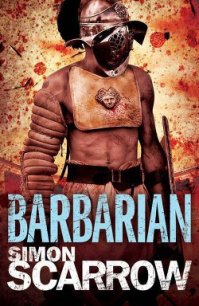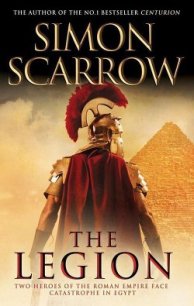The Gladiator - Scarrow Simon (бесплатная регистрация книга txt) 📗
They turned the horses down the path and urged them on. There was only a short distance to go, and then Cato and Macro emerged on to a thin strip of sand. The beach was a little over a hundred paces wide, and a handful of abandoned shacks lay clustered at the foot of the cliff. The rebels' horses had been left at the water's edge. A handful of small boats remained, and the two Romans swung themselves down from their saddles and ran across the sand towards them. Neither had sails, only oars. Cato grabbed the side of the nearest boat.
'Help me!'
He braced his feet in the surf and hauled the boat into the water as Macro grabbed the other side and pulled. It dragged stubbornly across the sand until a small wave lifted it up and they managed to heave it free of the shore. They pushed it out until the water was round their waists and then scrambled over the side. As Cato lifted the oars into the rowlock pegs and Macro sat heavily in the stern, the last sounds of fighting died away. The thin light of dawn filtered across the bay as Cato took his seat on the centre bench and desperately began to row out towards the liburnian. If the warship was still aground, then the rebels would not get away.
Cato knew that he and Macro were facing certain death once they reached the ship. He prayed that they might at least kill the gladiator before they were cut down, and that Julia could find some way to escape in the confusion. He looked over his shoulder and saw that he had closed the distance on the liburnian. Then he froze and looked more intently. The ship was moving up and down on the swell.
'I thought you said it had run aground,' said Macro.
'It was. The crew must have got her off just as the rebels came aboard.'
Cato realised that the marines must be dead, and the sailors and men at the oars were under the orders of Ajax and his followers. Cato started rowing again with all his strength, but his poor technique and frantic oar strokes were punished by the swell, which caused him to catch crabs on either side, one time lifting the oar right out of the pegs.
By the time they had closed to within fifty feet of the liburnian, Macro saw the long dark blades of the warship's oars bite down into the water. They made a stroke, rose, arced back and plunged into the sea again as the sleek vessel edged forwards.
'They're under way,' he said softly.
'No!' Cato groaned as he desperately redoubled his efforts.' No.
Please gods, no.'
The liburnian steadily gathered pace and began to swing out into the Bay of Olous, opening the gap between it and Cato. He kept rowing frantically, his limbs aching with the strain. The outline of the liburnian foreshortened as she presented her stern. Witha sickening certainty he knew that there was no chance of catching her now. He dropped the oars, rose to his feet, turned and braced his legs apart as he cupped his hands to his mouth and cried out,'Julia!...Julia!'
There was a pause before he heard her voice call back: ' Cato! Help me!'
Then she was cut off.
A pair of figures loomed up on the liburnians stern rail: Ajax, holding Julia tightly by the arm. He called out, mockingly,'You have lost her, Cato. Lost her for ever.'
'Julia!'
'She is mine now. Mine to do with as I will. Remember that.
Remember the vengeance of Ajax every day for the rest of your life.'
'No!' The cry was torn from Cato's lips.' No! '
Suddenly Julia's spare hand rose up. There was a glimmer of metal in her grip and she stabbed down into Ajax's shoulder. He recoiled with a bellow of surprise, pain and rage, glancing at the comb sticking out of his shoulder. Instinctively he reached for the wound with his other hand, releasing Julia. At once she threw herself over the stern rail, tumbling down into the sea with a splash. The liburnian was already gathering speed, and as Julia's head emerged above the water, gasping, the gap between her and the stern of the warship quickly grew. Cato had hurriedly taken up his oars again and was speeding the little craft across the water towards her as she struck out towards them with frantic splashing strokes.
Ajax had pulled the bloodied comb out and stood glaring down into the sea. There was nothing he could do to prevent her escape.
By the time he could turn the warship round and head back towards the beach, the little boat would have reached the shore again and his enemies would have escaped on the horses still on the beach. Besides, one of the Roman triremes was already heading back down the bay to come to the assistance of the liburnian that had run aground.
As the boat approached Julia, Macro scrambled to the bows, leaning over to reach out for her. Julia grabbed his wrist, and he hauled her closer before stretching out his spare hand to lift her under the shoulder.
'Up you come, miss!' he grunted as he pulled her over the side.
'I've got her, Cato. Turn us round and get back to the shore, quick as you can.'
Cato worked the small craft round and started for the shore, expecting the warship to turn back towards them at any moment.
But the liburnian headed steadily towards the mouth of the bay. The oars dipped and thrust through the sea at a regular pace as it drew swiftly away from the small boat. Ajax remained at the stern rail for a while, before he turned and disappeared from sight.
'We're safe,' Macro said in relief.
Cato lowered his oars and turned to embrace Julia as she stumbled towards the centre of the boat and fell into his arms. For a while all was still on the little craft. Cato held her tight, pressing his cheek to the top of her head as he breathed deeply. Macro turned away and stared after the liburnian as it disappeared around the small island at the end of the rocky peninsula and headed out to sea.
CHAPTER THIRTY-THREE
Three days later, Sempronius surveyed the remains of the rebel camp as he and his escort rode down to the beach where the remaining ships were undergoing repairs. The rest of the grain fleet had set sail the previous day, making directly for Rome, where the cargo should arrive in time to stave off any hunger and prevent the mob from having an excuse to riot. Despite his relief and joy that his daughter had been rescued, Sempronius's mood was soured by the inevitable aftermath of such a serious revolt on the island.
The senator had little doubt that there would be small reward forthcoming from the emperor for saving the grain fleet, and consequently keeping the peace on the streets of Rome. Four of the ships had been lost in the attack, and the officials in charge of the imperial granary would inevitably lodge a complaint against those they held responsible for the recovery of the fleet. Some kind of official reprimand was inevitable. Sempronius sighed. Sometimes being in the service of Rome was a thankless task, and he had to draw satisfaction from the knowledge that he had served his Emperor as best he could, despite losing four of the ships.
The loss of the grain was least of it, he reflected. It would be years before the province of Crete recovered from the earthquake and the slave revolt that had followed it. Although the revolt was over, there were still some unsavoury matters to deal with. Centurion Fulvius and his men had shown no mercy to the rebels and the bodies were still being buried in great pits dug into the rocky soil around the bay.
Thousands of them, men, women and children. The survivors had been sent back to Gortyna in long chain gangs under the guard of the hard-hearted men of the legions, who would show no pity to those who straggled or fell by the side of the road. Sempronius had passed them on his way to Olous: lines of captives with bleak expressions now that they had been returned to slavery after a brief taste of freedom. They were destined to be held in a special camp outside the city until their owners could be identified and informed. If the owners were dead then they would be come the property of the emperor and auctioned off. The sums raised, minus the hefty commission due to the auctioneer, would be forwarded to the imperial treasury in Rome. Sempronius smiled bitterly at the thought that at least some one in Rome would profit as a consequence of the revolt.




